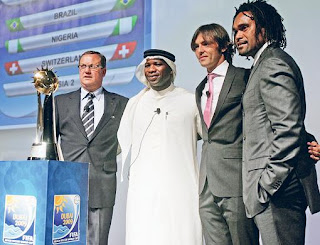North Wall, Portuguese Fort, Bidyah, United Arab Emirates
 The town of Bidyah in the United Arab Emirates, is found midway along the coast between Fujairah and Dibba. According to the Portuguese souces, the Portuguese had in the area a fort called Libidia. A team consisting of Australian and local archaeologists excavated the area in 1999. The site of the fort at al-Bidyah (25°26' N, 56°21' E) consists in a large square enclosure constructed with large boulders at the foundation level and smaller mountain and wadi rocks used for the successive courses. The forts walls are each around 60 metres in lenght. Excavation was concentred on the north western tower and both the northern and western fort walls. During the excavation were located the remnants of the north western and north eastern towers.
The town of Bidyah in the United Arab Emirates, is found midway along the coast between Fujairah and Dibba. According to the Portuguese souces, the Portuguese had in the area a fort called Libidia. A team consisting of Australian and local archaeologists excavated the area in 1999. The site of the fort at al-Bidyah (25°26' N, 56°21' E) consists in a large square enclosure constructed with large boulders at the foundation level and smaller mountain and wadi rocks used for the successive courses. The forts walls are each around 60 metres in lenght. Excavation was concentred on the north western tower and both the northern and western fort walls. During the excavation were located the remnants of the north western and north eastern towers.
The Portuguese forts in the Gulf and in Oman (1500-1650)

The Portuguese, shortly afterwards theirs arrival in the Eastern Seas, decided to prevent the Arab's trade, with the Ormuz conquest. For his strategical position dominating the entrance to the Persic Gulf, Ormuz was one of the two strategical stronghold on the trade routes between the Arab world and Asia (the other being Aden near the strait of Bab el Mandab). The city of Ormuz (Hormuz), was one of the most important trade centers of the whole East, in its market were exchanged Persian horses and pearls. The town was placed on a dry and barren island, near the Persian mainland at the entrance of the Persic Gulf.For nearly 150 years Portugal ruled the Persic Gulf area. Ormuz was regarded by Albuquerque as the third key of the Portuguese Empire in Asia (the others two were Goa and Malacca). BOOKS ON PORTUGUESE PRESENCE IN THE PERSIC GULF:
- Al-Khalifa, Shaikh Abdullah Bin Khalid and Abahussain, Dr. Ali "Bahrain Through The Ages - Vol.2"
- Al Maamiry, Ahmed Hamoud "Omani - Portuguese history"
- Andrada, Ruy Freyre de "Commentaries of Ruy Freyre de Andrada"
- Barendse, R. J. "The Arabian Seas, 1640-1700"
- Boxer, Ch. R. "Anglo-Portuguese Rivalry in the Persian Gulf, 1615-1635"
- Costa, Paolo M. "Historical interpretation of the territory of Muscat"
- Dias Farinha, Antonio "Os Portugueses no Golfo Persico 1507-1538"
- Dinteman, Walter "Forts of Oman"
- Gonçalves, Julio "Mascate, Albuquerque e os sultanatos do Oman 1507-1659"
- Kervran, Monik (ed.) "Bahrain in the XVI Century. An Impregnable Island"
-Kervran, Monique "Bahrain in the Sixteenth Century. Political and Military Events"
-Moreira, Rafael "Inofre de Carvalho: a Renaissance Architect in the Gulf"
- Kervran, Monik; Negre, Arlette; Michele Pirazzoli "Excavation of Qal'at al -Bahrain 1st Part (1977-1979)"
- Muir, J. "Reminiscencias Portuguesas na Arabia Oriental"
- Ozbaran, Salih "The Ottoman Turks and the Portuguese in the Persian Gulf (1534-1581)"
- Ozbaran, Salih "The Ottoman response to European Expansion. Studies on Ottoman-Portugese relations in the Indian Ocean and Ottoman administration in the Arab lands during the Sixteenth Century"
- Risso, Patricia "Oman and Muscat: an early modern history"
- Serjeant, R. B. "The Portuguese off the South Arabian Coast: Hadrami chronicles. With Yemeni and European accounts of Dutch pirates off Mocha in the seventeenth century"
- Slot, B. J. "The Arabs of the Gulf 1602-1784"
- Vine, Peter; Casey and Vine, Paula (eds.) "Oman in history"
- Ziolkowski, Michele "Al Bidyah excavations, 1999"











